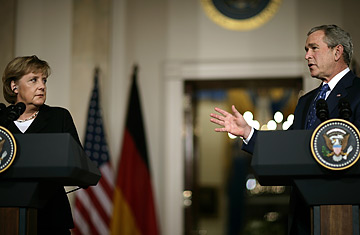
President George W. Bush and German Chancellor Angela Merkel.
When it comes to addressing climate change, the U.S. and Europe are like two cars racing toward each other in a game of chicken, according to Hans Joachim Schnellhuber, an adviser on climate issues to German Chancellor Angela Merkel. That may be overstating the case. But there's little chance that this week's G8 summit at the German seaside resort of Heiligendamm will resolve fundamental differences between the Bush Administration and E.U. countries led by Germany over how to combat global warming.
In an exchange reminiscent of the transatlantic chill that preceded the Iraq war, Washington and Berlin have traded barbs over the past two weeks over a draft communique that will be discussed later this week at the G8 summit. The spat was all the more surprising given the improvement in relations between the U.S. and Germany since conservative Angela Merkel replaced Gerhard Schroeder as German Chancellor in 2005. In the draft communique, Germany, backed by Britain's Tony Blair and other European leaders, proposes concrete targets for combating climate change.
The targets require taking steps to ensure that average temperatures on the planet increase by no more than 2 degrees celsius by the end of the century, and to slash greenhouse gas emissions to 50% of the 1990 level before 2050. But when the German draft was circulated two weeks ago in Washington, U.S. negotiators declared, in a document leaked shortly afterwards, that the German draft "crossed multiple 'red lines'" and that "there is only so far we can go, given our fundamental opposition to the German position." Then, on May 31, President George W. Bush announced his own climate change inititiative, which calls on the leaders of the 15 leading producers of the heat-trapping gases to develop long term voluntary emission-reduction goals. The proposal, notably short on specfics, raised concern in Europe that Bush was trying to make an end-run around the existing United Nations process for addressing climate change, which includes the Kyoto agreement. The German environment minister warned of a possible "trojan horse" designed to sidestep an agreement in Heiligendamm and "torpedo the international climate protection process."
Underlying the increasingly testy exchange are fundamental differences over how the climate crisis is to be addressed. The biggest worry in Europe is that the Bush Administration approach of stressing technology and voluntary targets will weaken the global effort under U.N. auspices to set mandatory targets. "America increasingly wants to use new technologies and in this way test how much carbon dioxide emissions can be decreased," Angela Merkel told the newsmagazine Der Spiegel. "We Europeans find it more compelling to agree on goals on an international level, and direct our efforts accordingly." She added: "I encourage [President Bush] to be courageous and lead the way with concrete climate protection goals."
Sigmar Gabriel, the German Environment Minister, added: "What we need now is a worldwide climate change regime. We need clear aims and we have to be able to check if the contracting partners stick to the goals."
Defenders of the Bush plan contend that it would actually help the U.N. process by bringing in countries such as China and India, along with the U.S., that have been reluctant to sign on to a more top-down approach. And tempers appear to be cooling as the G8 summit draws near. Merkel announced over the weekend that the U.S. President's proposals of May 31 were, in fact, "very welcome ... if they are channeled into the framework of [U.N. treaty negotiations]." Blair, speaking afterward, agreed that "it is good that the U.S. has made these commitments," while adding, "We need to make sure that we keep these targets within the U.N. agreement."
Still, the U.S. and the Europeans are unlikely to resolve differences when their leaders meet this week. Though there's a chance the Europeans could water down the communique by agreeing to remove concrete targets, Merkel insisted last weekend that she would not do so. No European leaders are going to suffer politically for standing up to the Bush Administration on global warming. But they point to President Bush's recent acknowledgement that man-made global warming is a reality as a sign of progress — and sufficient reason for avoiding a head-on collision, at least for now.
